Activate the Heart: Catapult Collective Builds an Eclectic Community With Weekly Live Music
by James Andrew Carroll | Published February 23, 2020 in Arts & Culture
20 minute readCatapult Collective is set to return to its Wednesday night smoothness on February 26. From 8 p.m. to midnight, Downtown Long Beach will groove to a special ‘70s Soul Train theme of the weekly event, featuring performances by local acts BLCKNOISE, Soular System, and more.
The venue, At the Top, is located on the second floor above Shannon’s Downtown. Its open layout is framed on one corner by a long bar, and on the opposite corner by two long walls of windows. The latter gives attendees, sitting in any number of lounge chairs and sofas, a chance to peek out over Broadway and Pine; and as the evening’s music shakes through the open windows into the Downtown air, it gives anyone passing by a chance to change whatever Wednesday night plans they thought they had, and come upstairs.
We sat down with Catapult Collective’s Shelley Bruce and Donovan Brown late last year—gathering ourselves onto a few sofas, drinks in hand—to hear their motivations for hosting a weekly event, their hopes for its future, and their struggles for the Long Beach music and art scene they’ve helped establish a home for in the heart of Downtown.
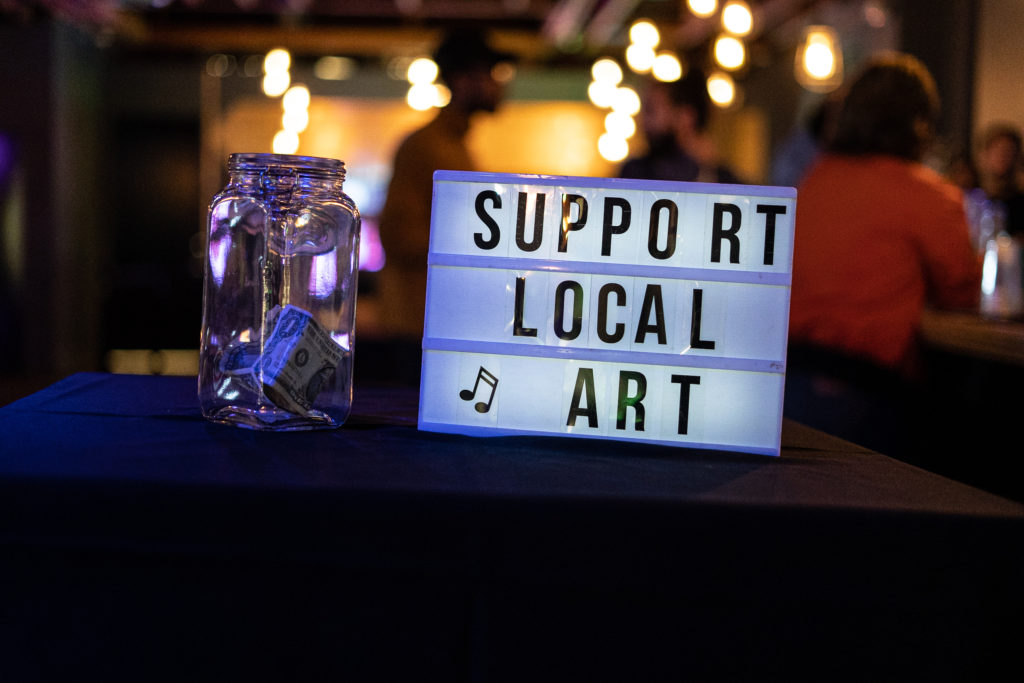
The event’s donation jar just getting started—paired with an important reminder.
FORTHE: So, let’s just start with the basics. How long has Catapult (@catapultcc) been going on for?
Shelley Bruce: We started in 2017, right?
Donovan Brown: Right.
Shelley: With a small group of friends. We did one event—one party in the OC. And then in 2018 we did another event at Made by Millworks. And then 2019 came around. Maybe you can elaborate?
Donovan: Yah, so she mentioned that we were doing Catapult Collective, which was like, basically, we’re trying to throw mini festivals—so mini versions of festivals in different locations. We did one in Anaheim at a warehouse, and it was pretty cool. We brought out Curtiss King (@curtissking) and Eddie Cole (@cole_forever) and Cameo Adele (@cameoadele_). Senay (@senaykenfe) was a DJ for that one. So we got some Long Beach and some OC—just trying to cross-pollinate, yah, and then we did one in L.A., and we had everybody represented. We did a live art show, like a live mural. So we kind of took some elements from that, and then brought it here.
FORTHE: And so what brought you specifically to this venue, At the Top? (@atthetoplb)
Shelley: I think mainly it was, you know, the BLCKNOISE (@blcknoise) is so successful in Long Beach, so the venue really wanted to have a residency with them, and then Donovan, with Catapult, decided we could bring even more than just the residency.
Donovan: Yah, initially At the Top hit us up to be the house band here, and just do a residency. So we’re just gonna play music. And I was like, well, I mean, I can do the residency, we can just play music, but we can also add production value because we have this established brand that we can just plug in, and bring some really, really dope artists in.
Victor Ujadughele (@prodbyujah), left, and Donovan Brown (@donmakesnoise), right, comprise local indie soul act, BLCKNOISE. You may remember them as the winners of last year’s Buskerfest—but if you haven’t yet heard the group, their newest single, “King on the Run,” is out now on all platforms.
Shelley: So, really incredible, being given the opportunity to incorporate some of the different artists from Long Beach, and it became a Wednesday night thing as of January 2019. We’ve been going every single Wednesday, since January.
FORTHE: Y’all have really been on a roll.
Shelley: Quite a commitment, but I’m proud that we’ve kept it going.
FORTHE: Yah, I mean, what’s the work involved with that? Because you’ve been at it with different artists all the time. Every time I look at your Instagram, it’s like some new featured artist.
Donovan: Yah, so I’ve been doing music for like 10 years, so I’ve had the chance to cross paths with some really, really talented people that don’t necessarily travel to different locations. And same for Shelley—she’s crossed paths with a lot of different artists who just, you know, they kind of isolate themselves. And I think the biggest thing that we wanted to see out of this was just like cross-pollination: different scenes supporting each other to meet people, getting access to different communities, because I think a lot of people can get benefit from just experiencing different stuff.
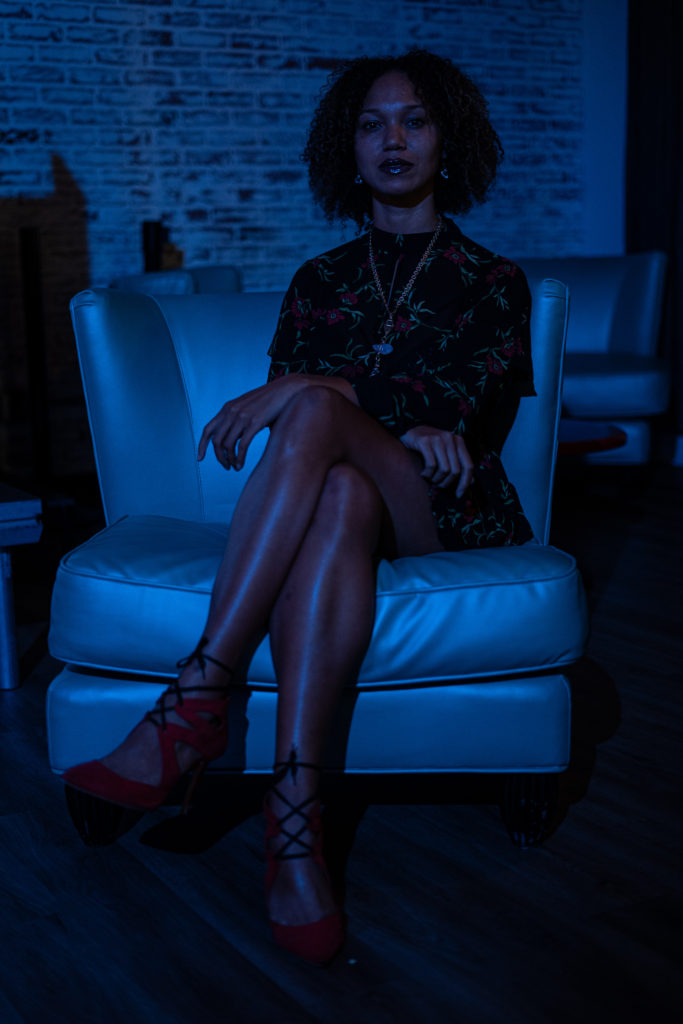
Along with her roles organizing for Catapult Collective, Shelley Bruce (@artistshelleybruce) also paints and performs poetry, and works to bring those and other forms of art into the event’s space each Wednesday, creating a genuine multimedia experience.
And even when you put together lineups to try and shift or switch up the genre a little bit. You might see a rap group if you like rap. But you also might see something more electronic-based or something that’s more, you know, more eclectic, just so you get exposed to different stuff. You might like it you might not, but you’re still there, you know? You’re in the room and you’re experiencing it.
The same thing with art. Like art is really well-paired with music; and a lot of people, they choose one or the other, they don’t consume both, you know—they might want to but they don’t. So we kind of make it easy, you know, you can see all of it, you can experience all of it, you can support it for free.
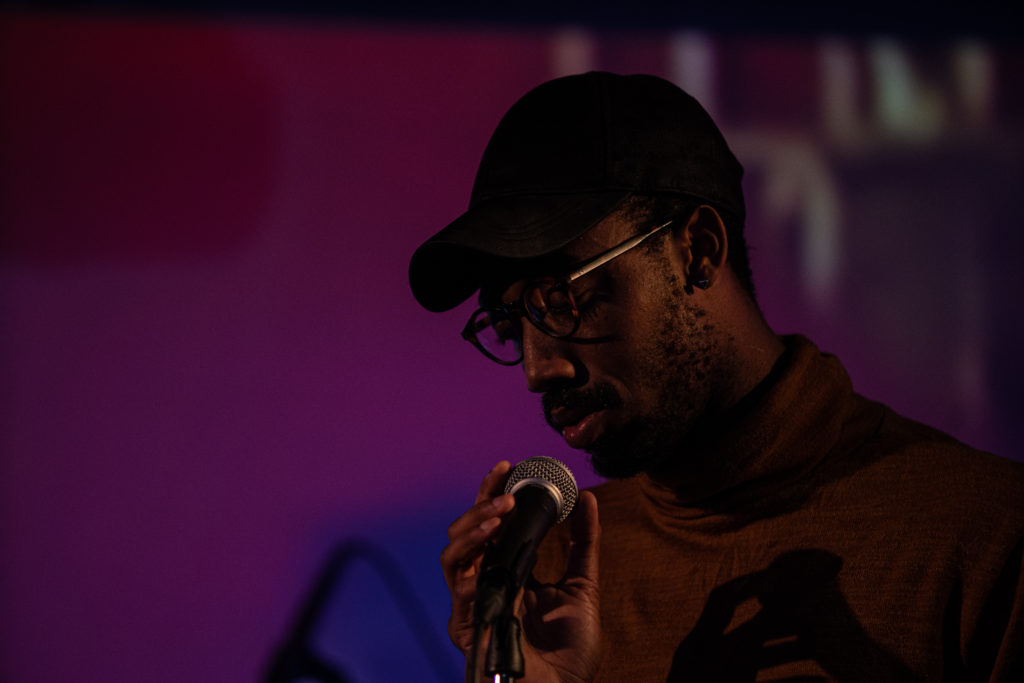
Donovan warms up the crowd with some vocal improvisations.
FORTHE: What’s been the ability of y’all to promote so well, and just to get people in the door on a Wednesday?
Donovan: What I would say is that the most important thing as far as getting people to come here consistently is to just keep doing it consistently. Keep doing it. We’re always here.
Shelley: Also we’re in a prime location, you know. People have often, literally, they were walking the streets and they said they heard this beautiful music… “What is this?” And it’s Donovan singing or it’s a band playing, because the windows are open upstairs. I think that’s also really cool about this location. Folks should know that this exists; and even on Wednesday, they can walk in and be a cultural participator. It’s really awesome that At the Top is prioritizing and activating this space for music and art, as well as just, like, making sure something’s going on on a Wednesday.
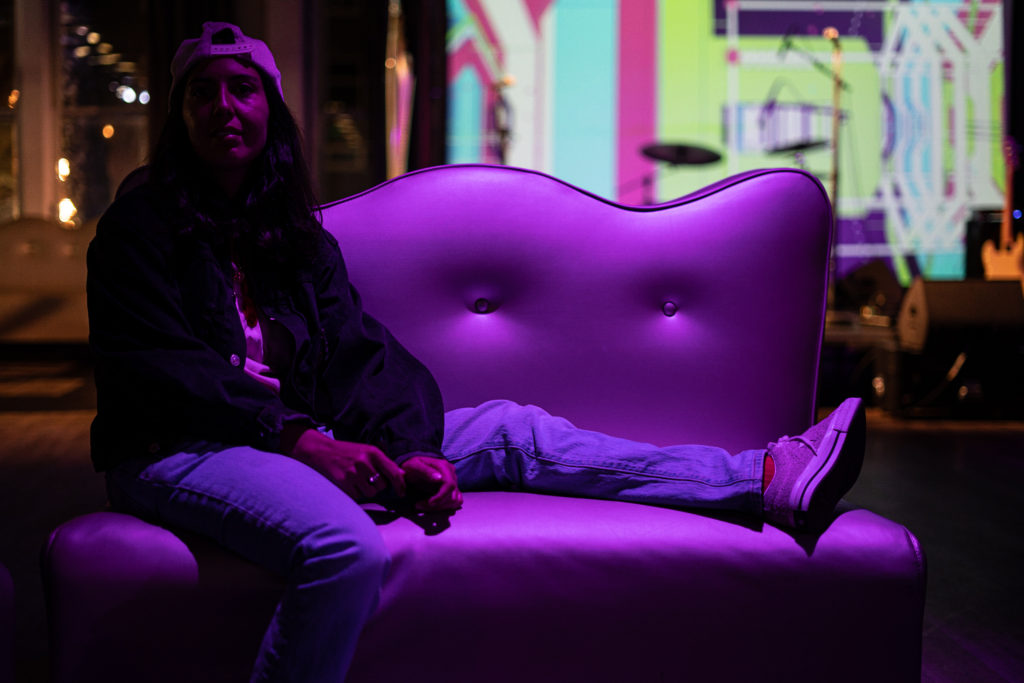
Roxane Douieb has been running sound for At the Top throughout Catapult’s tenure there. Shelley and Donovan both made sure we took time to highlight the venue’s great crew.
FORTHE: So what’s it been like for you two, because I know you’re both artists, you’ve got your own dreams, your own venues to play, your own things to put out there. But you’re creating this space for people, you’re supporting the scene, you’re building something, you’re cross-pollinating. So, I mean, just talk about maybe the sacrifices involved in running something like this?
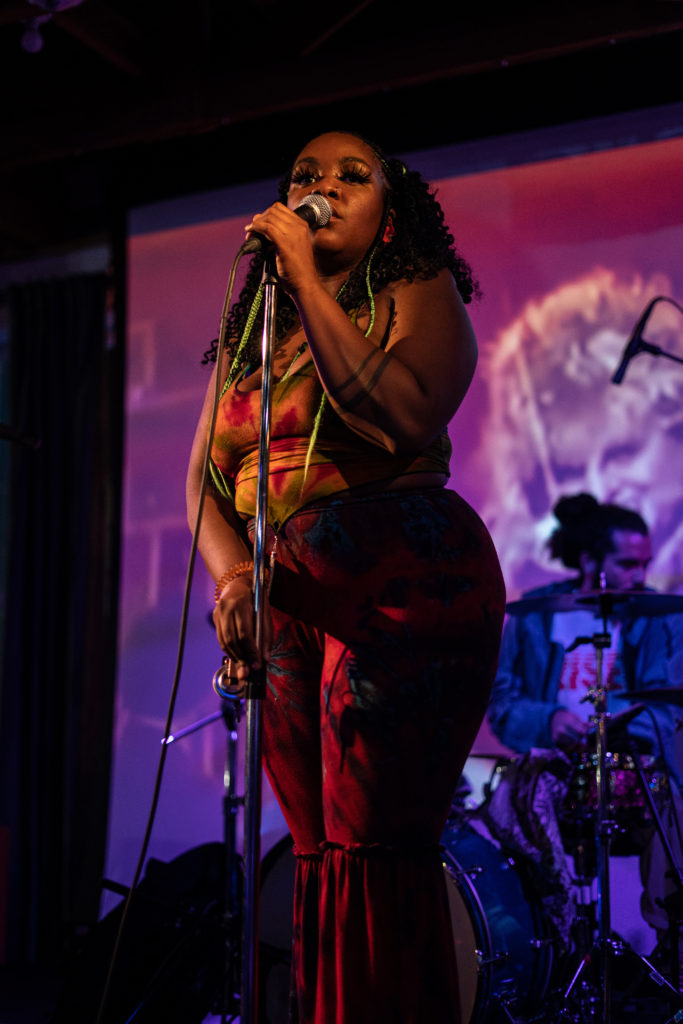
One powerful star in the Catapult scene is Refi (@refi_sings), whose voice can soothe you into a slow dance with a loved one, or sit you back down to reminisce on an old romance.
"A show's a show. But it's not necessarily going to change the culture of a city."
Donovan: I mean, me personally, I play way too many gigs as it is now. So like I get more joy out of seeing just a crowd really enjoying music than me necessarily playing the show.
Like this space wasn’t what it is now. It wasn’t considered what it is now, before we started doing this. And we’re slowly building a platform that’s going to help artists sustain themselves. And when I’m done with this, when I leave, someone else is going to pick it up, and it’s gonna be the same thing, the same vision, the same goal at the end. Me playing a show, and making people enjoy themselves for a night, is nowhere near as satisfying as creating that platform, that structure, you know.
Artists of color don’t get space in Downtown very much. I can name like three event series off the top of my head that cater to people of color, or artists of color, or anything besides, you know, the stuff you typically hear. Conventional, like folk, pop rock, whatever. So it’s really important that we continue to be adamant about what we’re doing.
And it’s not just that we only have black artists or anything. I mean, obviously, you’ve seen we have a variety of people, but we make sure that we showcase the diversity that exists here, and in communities all over California. Because just that image is enough to make people realize that that’s what’s missing. And the more they realize that’s missing, the more they’ll be like, “Okay, that’s worth investing in,” and they’ll bring more of it.
So I’m hoping that this leads to more things like it. You know, I can play shows anywhere. A show’s a show. But it’s not necessarily going to change the culture of a city.
Shelley: That’s something we definitely realized. We get to activate the heart of Downtown with independent artists, queer artists, artists of color, and then they get an opportunity to express their voice. And we’ve also had the opportunity to even do some socially-conscious events. We hope to do more.
We’re so grateful we get to do different types of themes. We did a night in March to celebrate people who identify as woman, or femme. We really try to switch up the theme, and that’s beautiful.
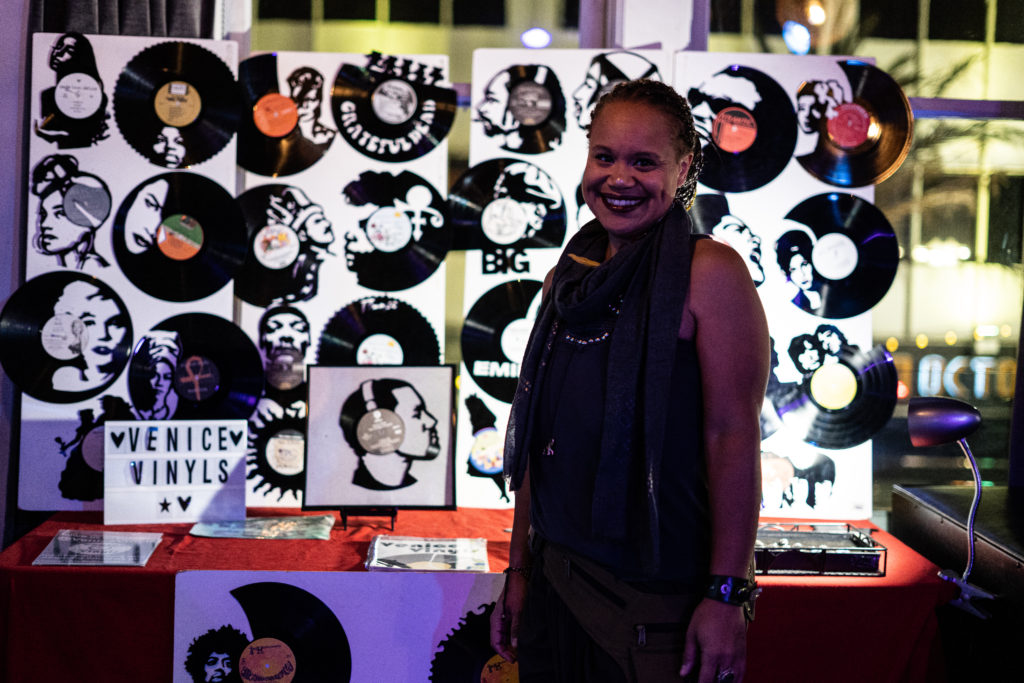
Catapult Collective has placed a focus on curating not just music for their events, but local artists as well, providing space for vendors, live muralists, and more. This is one of the owners of Venice Vinyls (@venicevinyls), selling famous portraits hand-cut, incredibly, from vinyl records.
FORTHE: How do you feel like your relationship is with the venue? Y’all feel like they’ve been supportive and it’s been great so far?
Donovan: I think they support the vision. I think At the Top sees the value in it. That’s what I’m saying. Put on enough stuff, make sure they see what it is. Because I think people are afraid of what they don’t know. A lot of the reasons why people don’t invest in certain things is because they aren’t familiar with it. So just by showing them that it is viable, it is valuable, there are people that will support it. They have gotten more, you know, excited and enthusiastic about it.
And obviously, we’ve had slow nights, and they have to pay their staff and the bar has to make money. So we’ve had discussions about what we could do to improve. But they’ve always been very proactive as far as like, supporting us. They put a budget towards us.
But at the same time, we all have to grow together in order for this to be what it’s supposed to be. This is a business, you know, and we are still in business. We’re not charging at the door, but this is going to be something that should, you know, generate income. We’re independent artists and we’re working to break free of the corporate structure.
Shelley: And pay our people more!
Donovan: Yah.
Tomisin Oluwole
Dine with Me, 2022
Acrylic on canvas
36 x 24 inches
Click here to check out our interview with Tomisin Oluwole, a literary and visual artist based in Long Beach.
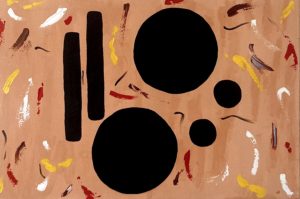
Instead of gunking up our site with ads, we use this space to display and promote the work of local artists.
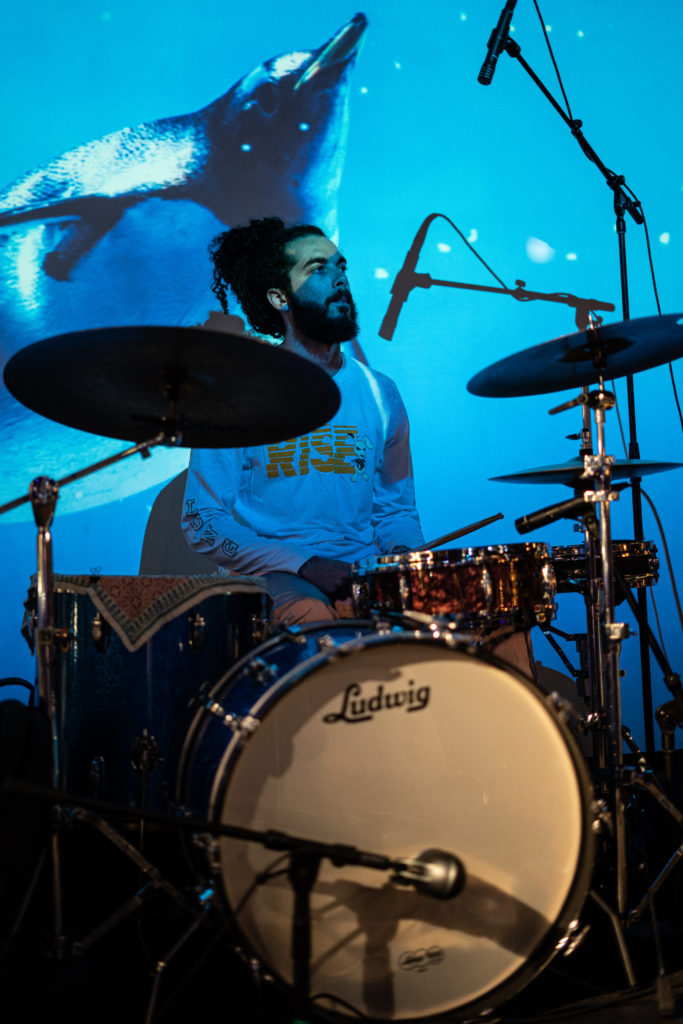
Tom Kendall (@tomkendallmusic) is a producer, composer, and simply one of the best drummers in the LBC. He is pictured here behind the kit for Soular System (@soularsystemsound), which was the featured act during our interview last year, and will be featuring again this Wednesday.
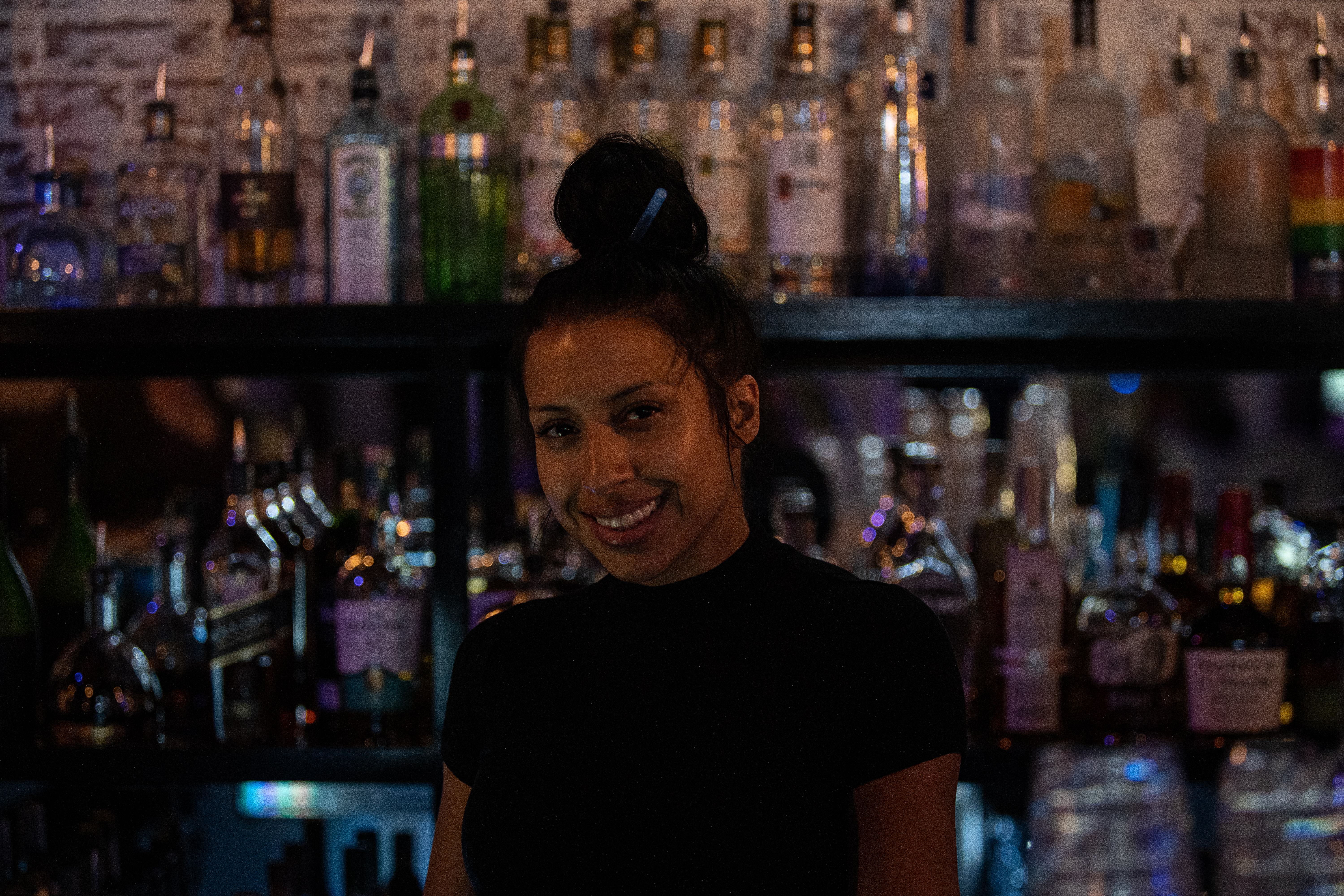
Tia Sabbag is a bartender for At the Top—seemingly every Wednesday, making her a fixture of the evening—and she keeps the charisma, and the drinks, on point for the rest of us.
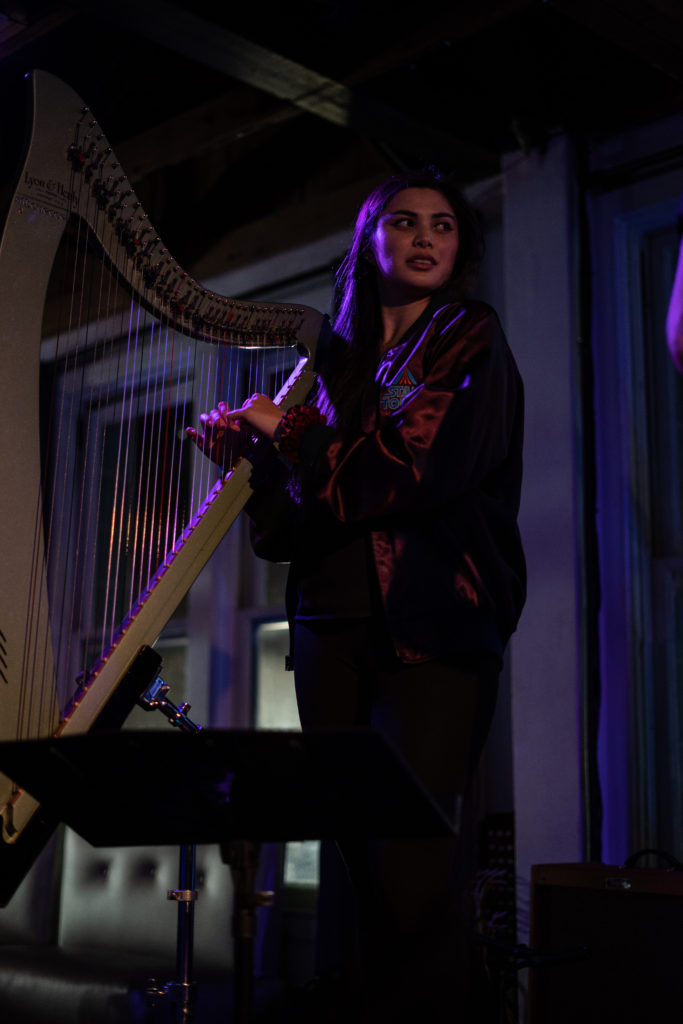
Gracie Sprout (@grey_seaa), aside from making her own music, also rocks the harp for Soular System, providing plenty of melodic touches to the group’s sound.

An inseparable part of Soular System’s seductive blend of jazz, hip hop, and soul is lead vocalist, Anthony Lynn (@anthonylynnnn).
FORTHE: And y’all have been paying people. Talk about that, the importance of paying people, or why you choose to do that.
Donovan: So day one, we were committed to pay people a set rate, no matter who the artist is. We established the rate before we even started.
Shelley: We are flexible a little bit, but for the most part, yah. And sometimes even if it’s, like, we add an extra person on the line-up, I think it’s 50 bucks or 75 bucks—that can make a big difference to an artist who’s hustling that week and needs one more gig. It’s really important. We know how important it is to get our own individual gigs and have the payment that can, you know, make or break your schedule really.
Donovan: It’s kind of demoralizing as an artist. Like, I’ve played shows where it was unpaid. For the first few years of me doing music, I played unpaid gigs, I played really low-paid gigs, and it’s demoralizing. It makes you doubt your own art. And I think that’s kind of what the L.A. scene is like—it’ll try and convince really talented artists that their talent isn’t worth anything.
I wish I could pay people their actual value, but I’m going to try and get as close to it as I can with the budget that we have.
Shelley: And I think also, you know, we definitely try and keep a rate, but at the same time, we always honor our artists and tell them hey, like, for the most part we know it’s not your full rate, but we just wanna let you know, we honor your time, this is what we can offer.
And another thing I want to go back to is in terms of us being a business at this venue. You know, I think for us, one of the great models we really appreciate is Fight Club.
Fight Club (@fightclublbc) is such a culture that is present in Long Beach, they have a great relationship with their venue. That’s definitely been a model for us. And at the same time, they’re their own brand. So even though we’re working this venue—our top priority is to make sure they’re successful, and that we honor the relationship with this very important establishment—we’re also a brand, and there’s other things that we’re interested in, like maybe online content, merchandise, other events at other places.
So for us at Catapult we want it to be greater than us ultimately—really create a culture and a community that will last.
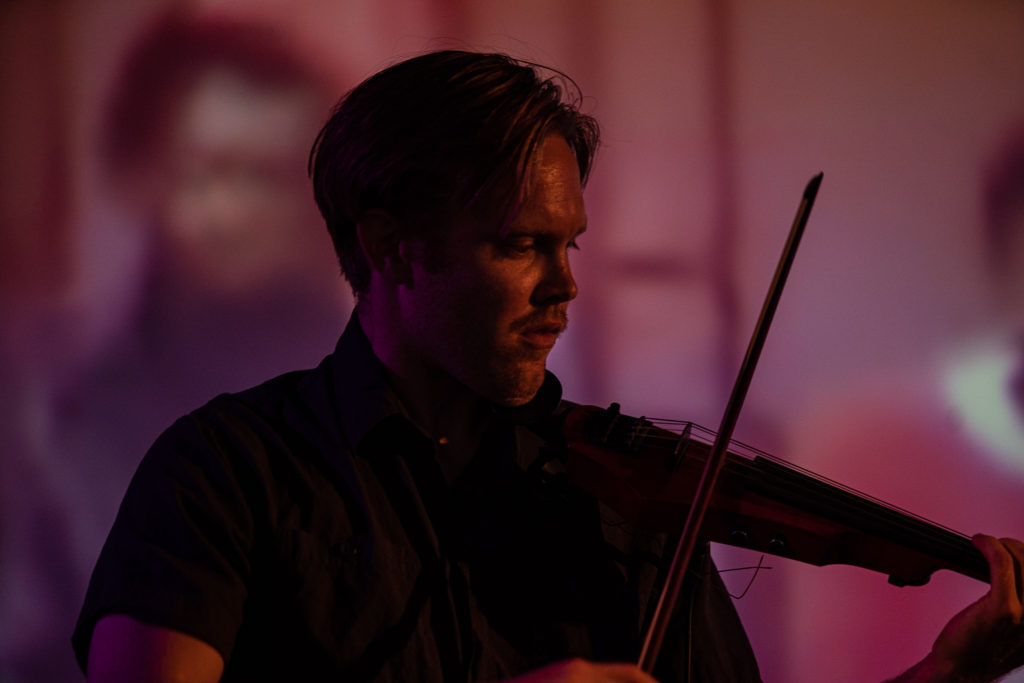
Trevor Torres (@trevorjtorres) brings super cool, lead-guitar-style violin work to Soular System, complete with flowing Jean-Luc Ponty-esque lines, and electric solos.
FORTHE: And the quality of the artists too is so top notch every week. Y’all have good taste. What’s the process like to get talented people in here every week?
Donovan: Yah, it’s just going to shows. If you go to shows, you’ll find people that have put on a good show. The quality has to stay consistent. If there’s a drop, our reputation does get hurt, so we just been seeking out people that are successful in what they’re doing. And people that are undiscovered, still coming up, and you know, like, you gotta mix it up a little bit—but that’s why we have the jam session nights where anybody can get up and perform. We have a jazz night where we can jam at the end of that. It’s sort of how we bring people in, like, yo, come perform at the jam, and we’ll be like, oh, yah, they’re good.
Shelley: Then also, it’s kind of indicative of our taste. And it’s nice to force ourselves to design this style of an event, with this eclectic, indy vibe. Like when you think of Fight Club, you have an idea of what you’re gonna get. I think when people think of Catapult, we’re hoping as we build the brand, people will have an idea of what they’re gonna get.
At the same time, it’s cool, because it’s kind of unpredictable, but people know that there’s a certain level of quality they’ll be able to get here. And we also want to bring bigger names to Catapult. We had Iman Omari, we had Supernatural (@mcsupernatural), who’s like a hip hop legend, which is great for Long Beach, but also just bringing more well-known acts to expand the brand, and give people access to that too.
"We want it to be greater than us ultimately—really create a culture and a community that will last."
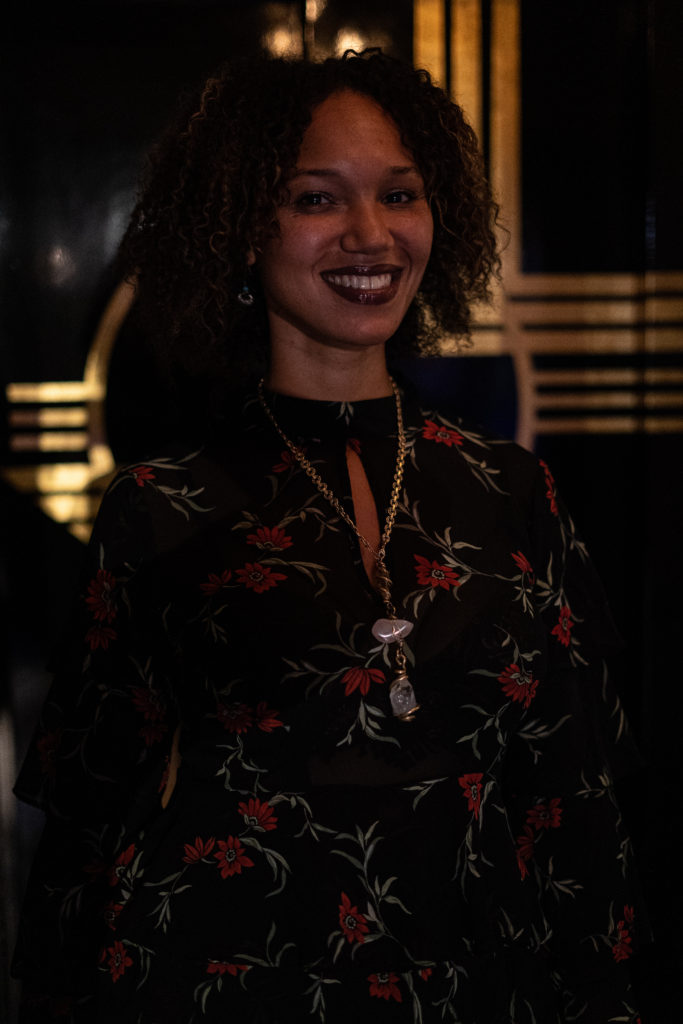
Shelley standing by for our photographer in between greeting folks as they enter the venue.
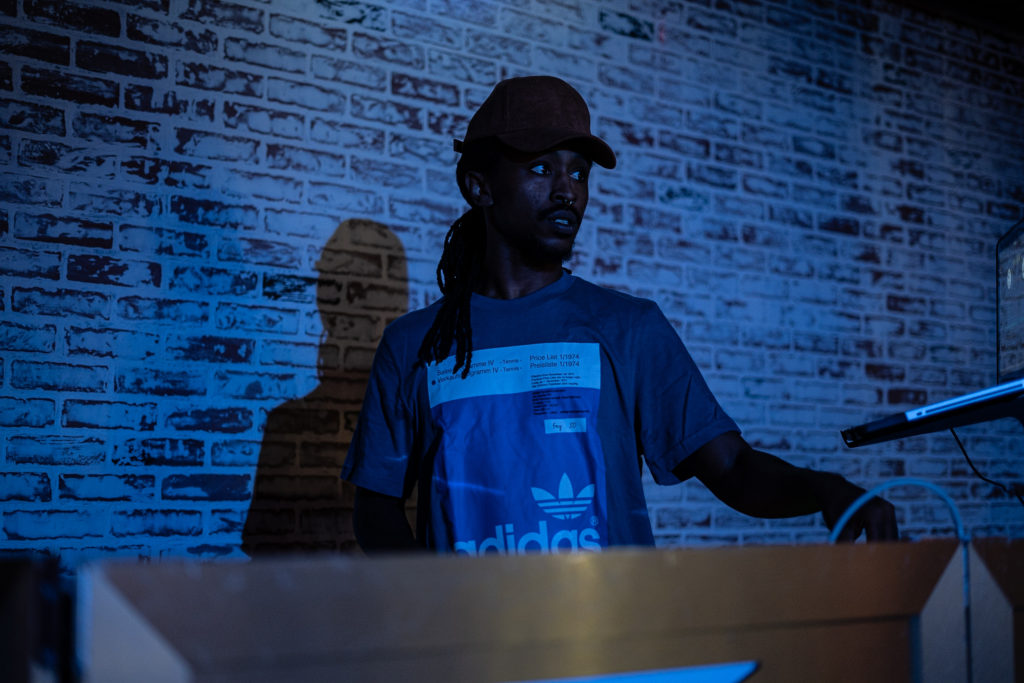
Shown here DJing, Iman Omari (@iman_omari) is one artist among the growing list of big names Catapult has brought to At the Top.
FORTHE: Heck yah. Cuz you know, some artists like skip Long Beach, or they come to Long Beach and they call it L.A.
Donovan: Yah, that’s not cool.
FORTHE: Is there a lot of Long Beach pride involved in what y’all are doing with this?
Donovan: For me, it is, yah. I think we deserve to have this really vibrant, thriving scene. I want there to be corporate investment in it. I want people to see that there’s value in the people, the artists that create here.
And I think the issue is partially on us because like, we get into this kind of self-serving mode, where we just create with ourselves and our friends. We don’t have any goals of going beyond that. So you don’t get the attention of anyone because your content, your presentation, your music, your art doesn’t match up with what the other scenes are doing, or putting out.
So yah, if someone’s coming through Long Beach, and then it’s like, oh, we’ll just skip it and go to L.A. Like L.A. has all this buzz around the venues and the artists that are there. And some of it’s contrived, and some of it is actually based on talent, you know? But the same talent is here. And I think people deserve to get the recognition for it.

Donovan is sitting stylishly here in one of At the Top’s swanky lounge sofas.
"I think that's kind of what the L.A. scene is like—it'll try and convince really talented artists that their talent isn't worth anything."
Shelley: There’s such a crazy, amazing scene here. I mean, before I started hanging out with BLCKNOISE, a lot of the other bands in Long Beach I didn’t really know, cuz I was doing a lot of stuff in L.A. But oh my god, I’ve come across so much good music based here. And so many different types of music. So I’m always like, I don’t wanna call it complaining, but I’m always pushing my L.A. friends to come to Long Beach. You can experience a band, like we had Complexions (@complexionsmusic), oh my god, an amazing group that I keep telling my friends to come check out.
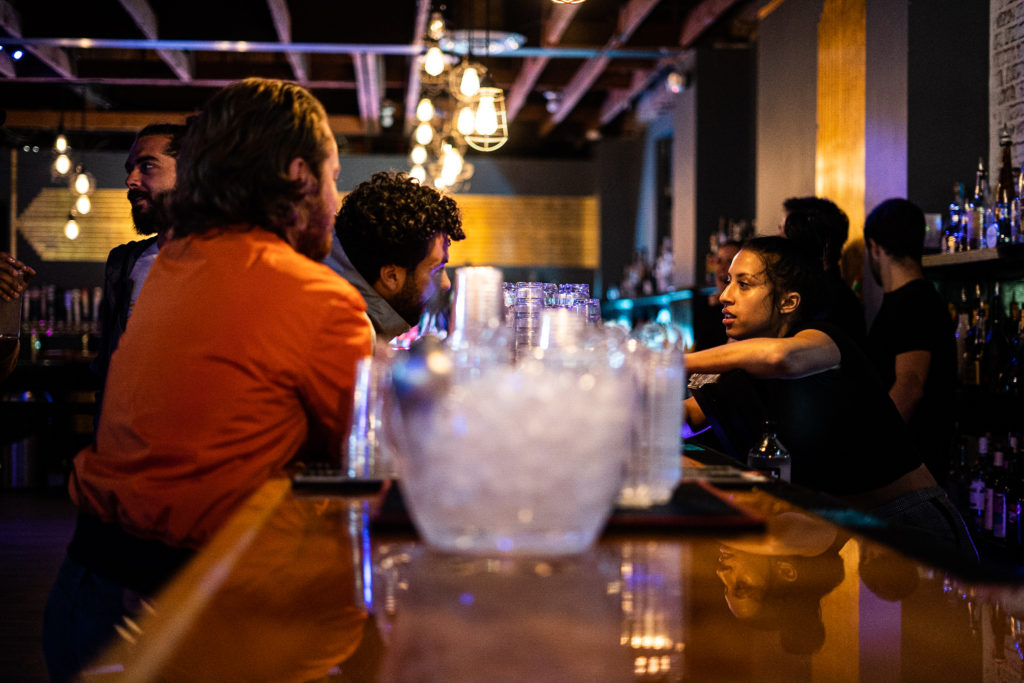
Patrons and musicians gather at the bar for a cocktail. And a little water won’t hurt.
FORTHE: You’ve talked about the kind of joy you get from this. So what are the positive things that you just feel doing this every Wednesday?
Shelley: Yah, I think people come every Wednesday and it’s just really medicine to them. They’re like, wow, this is a whole vibe, this is a culture that I really want to experience every Wednesday. So some folks are regulars. We have a bunch of regulars, you know, and people really come in and make friends, they come on dates.
FORTHE: Oh?
Donovan: I will say, if I’m trying to promote, 95% of the dates that happen here end in success. I only heard of one date that didn’t go well, and it had nothing to do with us.
Shelley: She brought a new date the next time, and that went good.
FORTHE: It was meant to be.

Holding it down for Soular System, as well as the evening’s jam session, were bassist Andrei Taru (@_dijondrei) and keyboardist Jake Abernathie (@jake.abernathie).
"I really feel like we have a Catapult tribe. It's family."
Shelley: But the last thing I really want to say, to me, like, no matter what is going on in my life, every time people come in here on a Wednesday, it’s so nourishing. And you know, Donovan and I also do tons of different community events, and I still get the same kind of feeling even at a Catapult event, which I was surprised to get at a late night event. Even though it’s a bar and late on a Wednesday night, like, I still feel there’s that family feel. I really feel like we have a Catapult tribe. It’s family. To me, that’s my purpose: feeling like we really are building a lovely community. I think that’s the heart of Long Beach.
FORTHE: Y’all have really built this thing up from scratch. So what’s next for you?
Shelley: We are expanding our team, so there’s some folks we’re reaching out to. We just wanna double our numbers and hope to bring in more vendors. We wanna grow our reach in the Long Beach scene. So please share, tell folks to follow, tell your neighbors and friends. We feel like residents in this area really appreciate this because they live right here, you know? So we just really wanna reach out. I’d love to bring in some dancers, I would love to do a fashion show at Catapult, actually. Just keep getting more creative, you know?
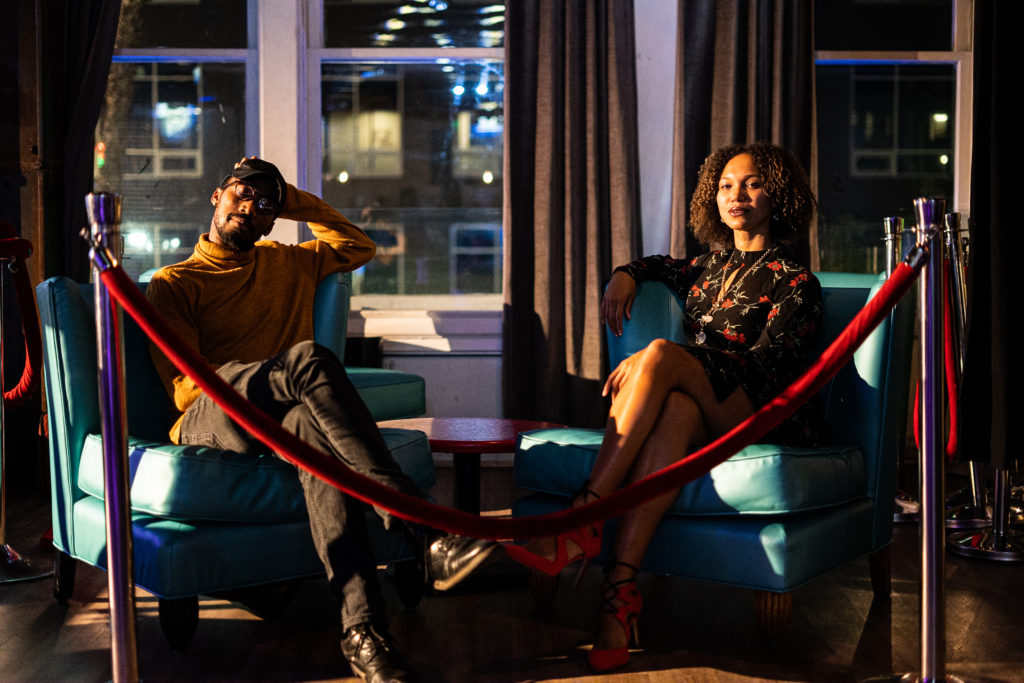
You can catch the return of Catapult Collective At the Top this Wednesday, Feb. 26, from 8pm to midnight. Soular System and BLCKNOISE, both featured in photos throughout this piece, are returning to the stage as featured acts.
The event is free, but you can donate at the door to support the artists. Be sure to follow any of the Instagram accounts provided above to keep up with individual artists as well.
All photos in this interview were taken by Santiago Charboneau (@svc.raw). You can also visit him at his website.
Help Us Create An Independent Media Platform for Long Beach
We believe that what we are trying to do here is not only unique, but constitutes a valuable community resource. We are dedicated to building a fiercely independent, not-for-profit, and non-hierarchical media organization that serves Long Beach. Our hope is that such a publication will increase civic participation, offer a platform to marginalized voices, provide in-depth coverage of our vibrant art scene, and expose injustices and corruption through impactful investigations. Mainly, we plan to continue to tell the truth, and have fun doing it. We know all this sounds ambitious, but we’re on our way there and making progress every day.
Here’s what we don’t believe in: our dominant local media being owned by one of the city’s wealthiest moguls or a far-flung hedge fund. We believe journalism must be skeptical and provide oversight. To do so, a publication should remain free from financial conflicts of interest. That means no sugar daddy or mama for us, but also no advertisements. We answer to no one except to our readers.
We call ourselves grassroots media not only because we are committed to producing work that is responsive to you, dear reader, but because in order for this project to continue we will also need your support. If you believe in our mission, please consider becoming a monthly donor—even a small amount helps!

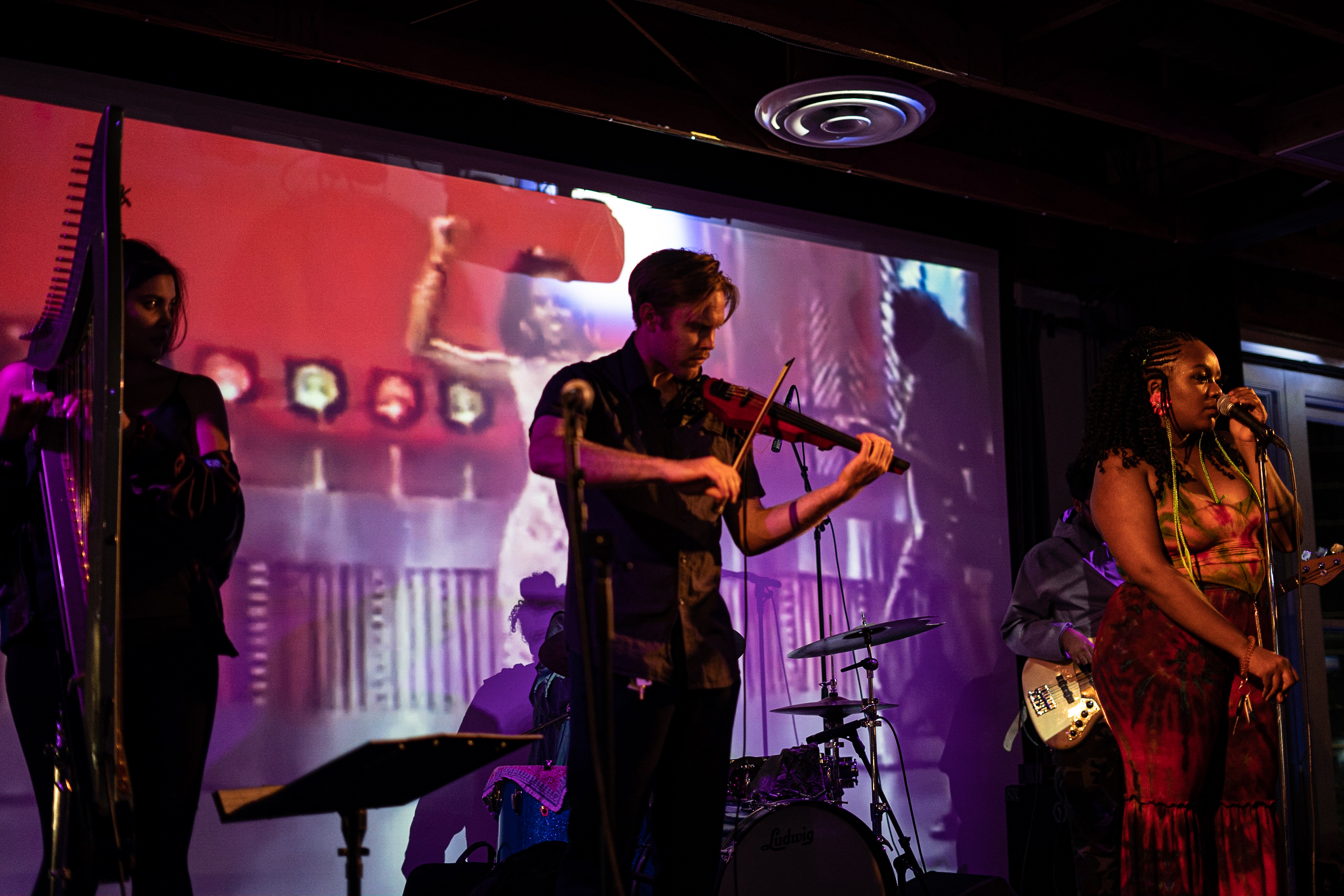
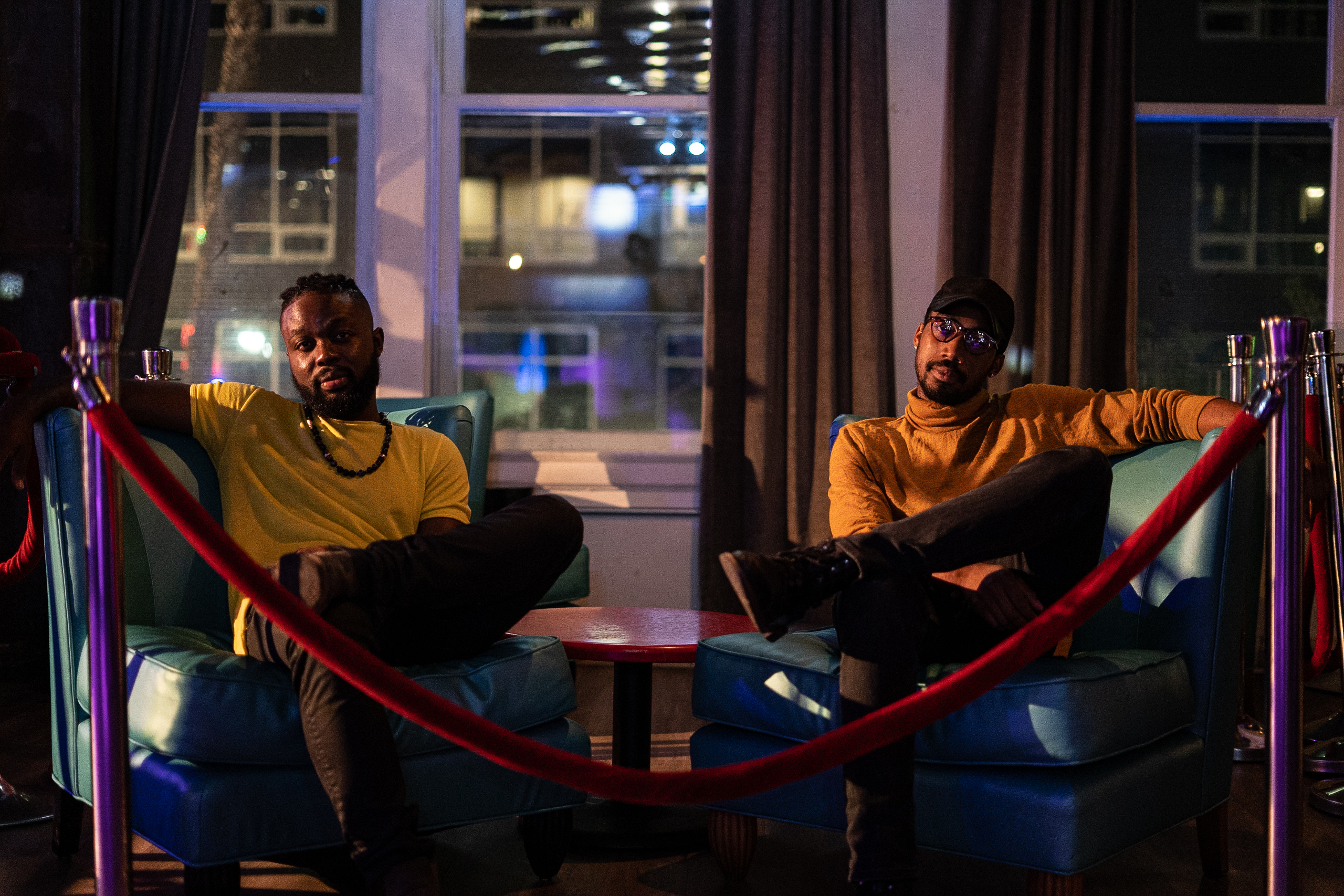
 andrew@forthe.org
andrew@forthe.org




